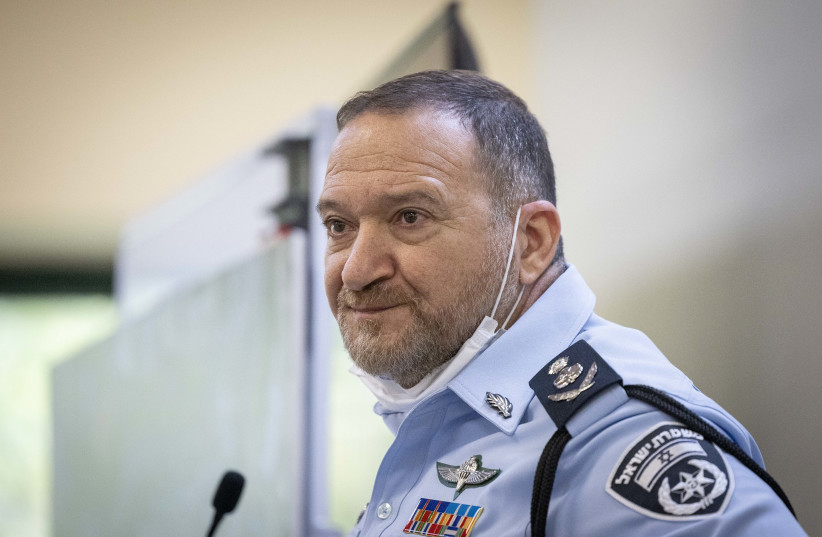While most attention post-election has focused on the character and intentions of the presumed next national security minister, far-right Otzma Yehudit head Itamar Ben-Gvir, it has meant that Israel Police Commissioner Kobi Shabtai’s behavior has dropped out of the spotlight. This would be a mistake.
As the top cop, Shabtai should be setting an example at a time when the police force is facing severe challenges. Instead, his actions are casting a shadow on the entire force.
The latest incident came on Thursday. Ben-Gvir openly opposed some senior police positions, approved by outgoing Minister Omer Bar Lev. Ben-Gvir felt they should have waited until after the government was established so that he could have a say.
Among the new appointments are the police chief for Judea and Samaria, the Border Police head for Judea and Samaria and head of the police special forces in Jerusalem against whom Ben-Gvir had filed a complaint saying the officer had attacked him when he visited Jerusalem’s Sheikh Jarrah neighborhood.
Ben-Gvir had reportedly asked Shabtai to try to freeze the promotions Bar Lev wanted but they went ahead after Attorney-General Gali Baharav-Miara found no reason to stop them.

On Thursday, Shabtai missed the ceremony in which the police officers received their new positions, claiming, according to reports, that he had an urgent referral for a medical appointment.
The “diplomatic headache” however did not last long and Shabtai later was seen at the bat mitzvah ceremony of Ben-Gvir’s daughter.
Shabtai’s behavior was perceived by many as an act of trying to find favor in the eyes of the likely new minister who will be in charge of the police force, while deliberately slighting the newly promoted officers.
Shabtai is unsuitable to be Israel's police chief
This could be seen as a relatively small matter that leaves a bad taste in the mouth but of no significant long-term impact but it is just one in a string of actions that call Shabtai’s suitability as police chief into question.
Recently, KAN published recordings of Shabtai belittling the likelihood of violence just days before the Arab riots in mixed Jewish-Arab towns and elsewhere during Operation Guardian of the Walls in 2021. There was also widespread criticism at the time of the way the police responded to emergency calls during the riots.
In an interview in Yediot Aharonot in September, Shabtai recommended shutting off access to social media if riots break out again. “I am of the opinion that in such situations, the networks should be blocked,” Shabtai told the paper. “It’s already a war. The social networks are the ones that take people out into the field. I’m talking about a sweeping closure of the networks. Turn it off, calm the area and let the situation calm down.”
In other words, not only were the police under Shabtai poorly prepared for the violence and unable to deal with it properly, Shabtai showed exceedingly poor understanding of the nature of a democracy in his recommended response.
The riots came just before another incident in which Shabtai showed he is not the right person to hold the most senior position in the Israel Police. In the greatest civil disaster in Israel’s history, 45 people were crushed to death at the Meron Lag Ba’omer celebrations.
Distressing recordings of the pleas of police at the site begging for reinforcements to stop the stampede were released by KAN last week with those calls for help being ignored until it was too late.
A state-appointed commission of inquiry warned Shabtai that he might be found culpable for what had happened, but Shabtai himself deflected any blame, placing it on his subordinates, as is his wont.
Shabtai’s response was similar after the fiasco of Al Jazeera reporter Shireen Abu Akleh’s funeral, where riot control police officers charged into the crowd of mourners almost causing the pallbearers to drop the casket as they were leaving St. Joseph’s Hospital in Jerusalem to bury the body of the slain journalist. Here, too, the police were not prepared and could have handled the affair differently and with greater sensitivity.
The country deserves a better police force and the police deserve a better chief. It will be impossible to truly rehabilitate the police while Shabtai remains in the top position. It is time for change.
